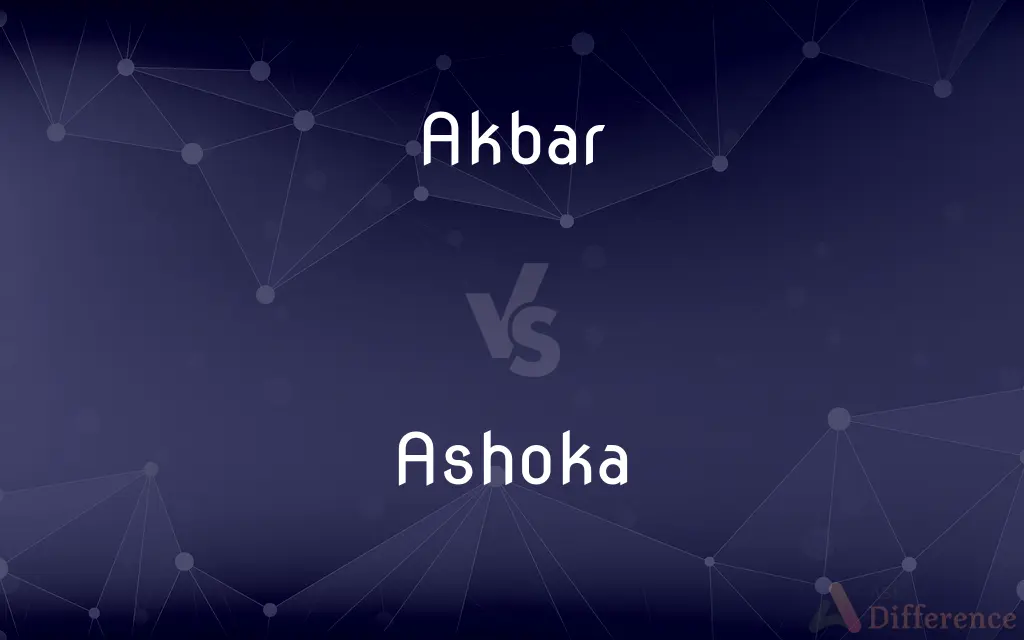Akbar vs. Ashoka — What's the Difference?
By Tayyaba Rehman — Published on January 23, 2024
Akbar was a Mughal Emperor known for his military conquests and administrative reforms, while Ashoka was a Mauryan Emperor famous for his conversion to Buddhism and spreading its principles.

Difference Between Akbar and Ashoka
Table of Contents
ADVERTISEMENT
Key Differences
Akbar (1542-1605), the third Mughal Emperor, is known for expanding the Mughal Empire across the Indian subcontinent through military conquests and alliances. Ashoka (304-232 BCE), the third Mauryan Emperor, also expanded his empire extensively but is most renowned for his conversion to Buddhism after the Kalinga War and his efforts to spread Buddhist principles.
The governance style of Akbar was inclusive and innovative, promoting religious tolerance and cultural integration in a diverse empire. He established a centralized administrative system with efficient tax policies. In contrast, Ashoka's rule, particularly after his conversion to Buddhism, was marked by non-violence, religious tolerance, and welfare policies aimed at the well-being of his subjects.
Akbar is celebrated for his patronage of arts and culture, which led to the development of a unique Indo-Persian culture, prominently visible in architecture and painting. Ashoka, while not as noted for artistic patronage, left a lasting legacy through the Ashoka Pillars and Edicts, which propagated Buddhist teachings and moral codes.
Akbar's religious policy was known for its syncretism, most notably reflected in the establishment of the Din-i-Ilahi, an attempt to blend elements of various religions. Ashoka, after adopting Buddhism, focused on ethical governance and the spread of Buddhist values, without enforcing it as a state religion.
The historical impact of Akbar includes the establishment of a strong central government that influenced Indian politics for centuries. Ashoka's impact is most profound in spreading Buddhism across Asia and establishing it as a major world religion.
ADVERTISEMENT
Comparison Chart
Time Period
1542-1605
304-232 BCE
Empire Expansion
Expanded Mughal Empire significantly
Expanded Mauryan Empire, later promoted peace
Governance Style
Inclusive, centralized administration
Ethical governance post-Buddhism conversion
Religious Policy
Promoted religious tolerance, created Din-i-Ilahi
Spread Buddhism, ethical governance
Cultural Impact
Patronage of arts, Indo-Persian culture
Ashoka Pillars and Edicts, spread of Buddhism
Compare with Definitions
Akbar
Promoter of religious tolerance.
Akbar's policy of religious tolerance was ahead of his time.
Ashoka
Spreader of Buddhism in Asia.
Ashoka played a key role in making Buddhism a major world religion.
Akbar
Patron of arts and culture.
The Mughal painting style flourished under Akbar's patronage.
Ashoka
Erected pillars with edicts promoting Buddhism.
The Ashoka Pillars spread Buddhist teachings across his empire.
Akbar
Innovator in governance and administration.
Akbar established a centralized administrative system.
Ashoka
Renowned for non-violence post-conversion.
Ashoka's commitment to non-violence influenced his entire reign.
Akbar
Creator of Din-i-Ilahi.
Akbar attempted to blend elements of various religions in Din-i-Ilahi.
Ashoka
Mauryan Emperor who embraced Buddhism.
Ashoka adopted Buddhism after the Kalinga War.
Akbar
Mughal Emperor known for empire expansion.
Akbar greatly expanded the Mughal Empire's territory.
Ashoka
Known for his moral and ethical governance.
Ashoka's rule was marked by compassion and welfare policies.
Common Curiosities
When did Ashoka reign?
Ashoka reigned from approximately 268 to 232 BCE.
Was Akbar a patron of the arts?
Yes, Akbar was a great patron of the arts, notably fostering the development of Mughal painting and architecture.
What era did Akbar rule in?
Akbar ruled from 1556 to 1605 during the Mughal era in India.
Who was Akbar?
Akbar was the third emperor of the Mughal dynasty in India, known for his military conquests and administrative innovations.
What is Akbar most known for?
Akbar is most known for his expansive empire, religious tolerance, and cultural contributions.
Did Akbar have any unique religious policies?
Yes, Akbar was known for his policy of religious tolerance and created a syncretic religion known as Din-i-Ilahi.
What was Akbar's approach to different religions?
Akbar adopted an inclusive approach, respecting and incorporating elements from various religions.
What are the Ashoka Pillars?
The Ashoka Pillars are a series of columns distributed across the Indian subcontinent, inscribed with edicts promoting Buddhism and moral principles.
Who was Ashoka?
Ashoka was the third emperor of the Mauryan dynasty, famous for his conversion to Buddhism and spreading its teachings.
Was Ashoka known for military conquests?
Ashoka initially expanded his empire through military conquests but later embraced non-violence after converting to Buddhism.
How did Ashoka communicate his policies?
Ashoka communicated his policies through inscriptions on pillars and rocks throughout his empire.
What is Ashoka’s most significant contribution?
Ashoka's most significant contribution was the spread of Buddhism and his ethical approach to governance.
Did Akbar expand the Mughal Empire?
Yes, Akbar significantly expanded the Mughal Empire through military conquests and alliances.
How did Ashoka impact Buddhism?
Ashoka greatly expanded the influence of Buddhism through his edicts and pillars, and his support helped establish it as a major world religion.
What legacy did Akbar and Ashoka leave behind?
Akbar left a legacy of a strong centralized empire with rich cultural heritage, while Ashoka's legacy is marked by his role in spreading Buddhism and ethical governance.
Share Your Discovery

Previous Comparison
Steam Mop vs. Crosswave
Next Comparison
Interfacial Tension vs. Surface TensionAuthor Spotlight
Written by
Tayyaba RehmanTayyaba Rehman is a distinguished writer, currently serving as a primary contributor to askdifference.com. As a researcher in semantics and etymology, Tayyaba's passion for the complexity of languages and their distinctions has found a perfect home on the platform. Tayyaba delves into the intricacies of language, distinguishing between commonly confused words and phrases, thereby providing clarity for readers worldwide.
















































